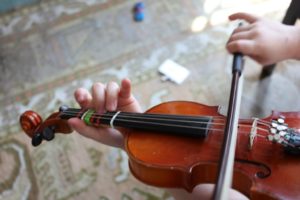Busibombs
posted July 19, 2012

“Mama, what are busibombs?” my six-year-old asked me tonight, making a delightful mondegreen out of the number one term the grown-ups in our family offer the children when explaining why we can’t do whatever it is we all wish we could do––”busyness.” I suspect we’ll be referring to busibombs for years to come, though part of me hopes we come to our senses sooner rather than later as busyness is truly the scourge of our times. She asked the question because we were tossing a number of busibombs around and concluding that we were probably too busy to do them.
“Busibombs” are delectable events that get lobbed into the midst of our already full-to-the-brim existence and send us sprawling against the walls, only to pull ourselves up, resentfully and sleepily, too stupid to do anything right, but too attached to let go of any of amazing treats exploding out of this crafty pinata of a missile. Today’s busibombs include a new teaching opportunity, an invitation to play music at the church we are almost always too busy to attend, the desire for our youngest child to start cello lessons this fall with accompanying scramble to find the time to add this in, a gig in Vermont on the same day for which our son’s birthday party had been scheduled, and the fantasy of trading our truck in for a Vanagon so we can car camp on Cape Cod and Yosemite.
By now you have probably read the recent New York Times piece on busyness. If you are like me, you will be too busy to read it. My favorite line is, “More and more people in this country no longer make or do anything tangible; if your job wasn’t performed by a cat or a boa constrictor in a Richard Scarry book I’m not sure I believe it’s necessary. I can’t help but wonder whether all this histrionic exhaustion isn’t a way of covering up the fact that most of what we do doesn’t matter.”
My first response was “Amen, brother!” And I would have chortled and nodded my head, too, if I had read this ten years ago. I was like the author: someone who had figured out how to make a living working about four hours a week, not counting the time it took to get to the gigs that paid me to live like this, but since that travel time was perfectly pleasant, who cared? Even if you amortized my salary over the travel time and performing time, I still made off well. I used my travel time to read, write, correspond, see the country and my far away friends, have adventures, and best of all, just stare out the window of the airplane, car or van. I certainly had plenty of time to write my novel and my songs, and even the newsletter that went out to our fans and the occasional email which had not yet taken over my inbox. Somehow I also used to have time to run 6 miles a day, and do yoga and Pilates three times a week. And I wrote three pages of brain-drain in my journal first thing in the morning. And I read novel after novel, lining them up under my bench seat in the van as though on a shelf. And I napped. Oh, how I napped!
Then I examined my own life today and I stopped chortling and noticed bitterly how the guy has no kids and appears to be independently wealthy. He has no clue, I muttered. Today, it’s a huge feat if I even open one daily email from the New York Times. I rarely check Facebook, I never watch TV and read almost only audiobooks. This is very bad for anyone, but especially bad for writers and artists who need time to read and reflect. Why do I let myself get this busy? How did this happen? Who can I blame?

The current epicenter of busibombs is a week-long Suzuki camp where my daughter is a camper and I am the music enrichment teacher, though even if I weren’t teaching, I’d still be exhausted as parents are expected to be fully present and awake, taking notes on their child’s lessons and classes, going to parent lectures, attending (without smartphones) daily hour-long recitals. On day three, one of the master teachers told us parents that she and the other teachers were all horrified at the lack of polishing and refinement our kids pieces evinced at these daily recitals. “They don’t need to be perfect,” she said. “But they do need to try to be perfect.”
I had genuinely mixed feelings about this. No one loves to listen to a Bach concerto played woodenly or with multiple stops and starts, but to my mind it’s worth the stumbles to witness the process, to see kids get up in front of their peers and demonstrate their hard work. Also, as a professional musician, I happen to love the moments when we–or my peers– mess up and keep on going. The music is so much bigger than the musician. I know that we are going to forget lyrics, I’m going to play the wrong chord or speed up phrases here and there, but ultimately, the show is about so much more than the musician’s artistry or lack thereof. It’s about courage and honesty and reaching for beauty. When I see kids attempting Bach or Brahms it sends chills up my spine, even when their efforts fall short of perfection. So I quietly disagreed with the teacher, and also noted that I can ask more of my child. Sometimes I don’t push her on the refining aspects because I am in too much of a hurry and too busy to take the time, to weary to have the fight.
That night when I came home, my husband said, “It’s a hot day. Let’s go to the beach and bring a picnic.”
“Sorry,” I said. “We have to practice violin.”
He looked at me as though I’d just suggested we build an igloo in our front yard. “But she’s been playing violin all day! It’s summertime!”
I leaned against the counter, knowing if I didn’t do some deep yogic breathing in that moment, I might explode–and not like a pinata.
“The teachers require it,” I said through gritted teeth.
“So?” he said.
“So I want my daughter to go to camp tomorrow prepared. They have a concert on Friday.”
“It’s Wednesday,” he said dismissively. “She can practice tomorrow.”
I wanted to cry. How could he not get it? Were we that far apart? What was wrong with the nuns who educated him? Didn’t they teach him to strive for perfection?
And then I was crying. My two kids came and hugged my legs anxiously as they do whenever I cry in front of them.
“You’re challenging my every tribal assumption!” I wailed.
And he was. My father regularly woke at 5 and was out of the house before we got up. He’d return at ten and kiss us softly on the tops of our sleeping heads. On Saturdays, he and my mother would drive for hours to compete in professional level tennis tournaments, rush home to shower and go out to a party. On Sundays they’d wake early to prepare for “Junior Worship,” a music and Bible story program they ran at our church. Sunday afternoons were family time, but we spent these playing competitive family tennis and going out for dinner, the self-appointed judges of the area-wide Perfect Pizza contest. When my sisters and I woke on weekday mornings, we’d inevitably find my mother head in hand, elbow on the kitchen table frantically grading her high school students’ history papers and preparing for her classes. Certainly we were told we did not need to be perfect. But the assumption that we’d better spend our waking moments trying was mixed deeply into the very plaster of our walls.
Tom relented and we made a quick swap: he’d be my practice ally that night if I agreed to go to the beach the next. I agreed (though I made my daughter practice Thursday before the beach.) “We can’t right all our parents wrongs,” I said. “But we can try. I wish someone had pushed me musically when I was her age.”
Tom looked at me funny, and nodded, perhaps as though I were an Alzheimer patient. The next day when I repeated this to another parent at the camp, he said, “But you wouldn’t be the artist you are if you’d become a virtuoso.”
These busibombs, they come by phone, by email, in the heart of a child bursting into the kitchen with some new plan that sets my carefully worked-out scheme off course; and then we follow it. As we crouched in the cool water of the lake on Thursday, the sun just beginning to set behind the trees, our kids splashing and yelling at us to watch their new strokes and their latest daredevil feats, I sighed and took Tom’s hand. “You win,” I said. “This is the thing to do. God’s here in this lake. We’re going to wake up exhausted tomorrow, but this is what we will remember. Thank you.”





nerissa, here i am ‘too busy’ to linger, but i’ve read enough to thank you, genuinely applaud your writing, and tell you tom is very smart.
love
karen
Thanks, KJ. He is smart and I am the luckiest.
Miss you!